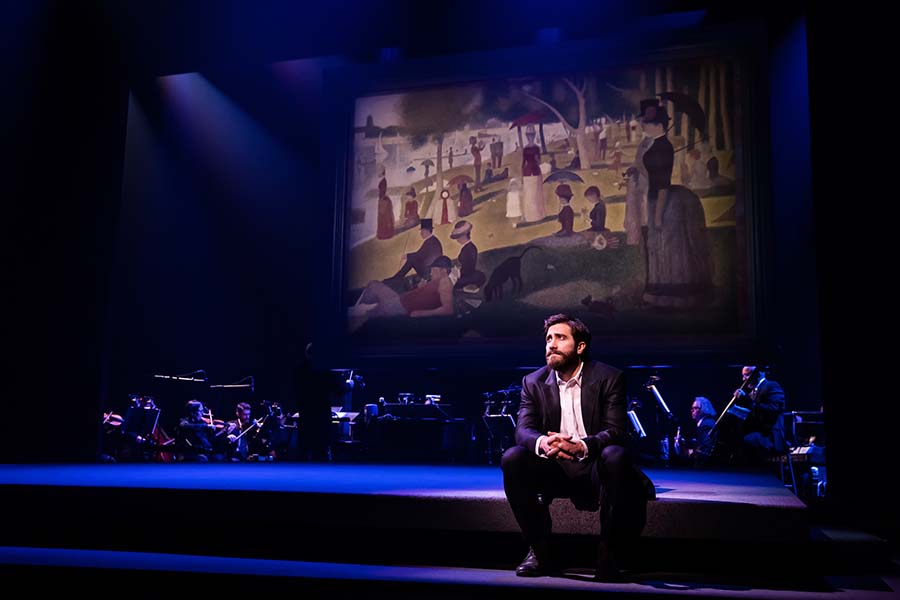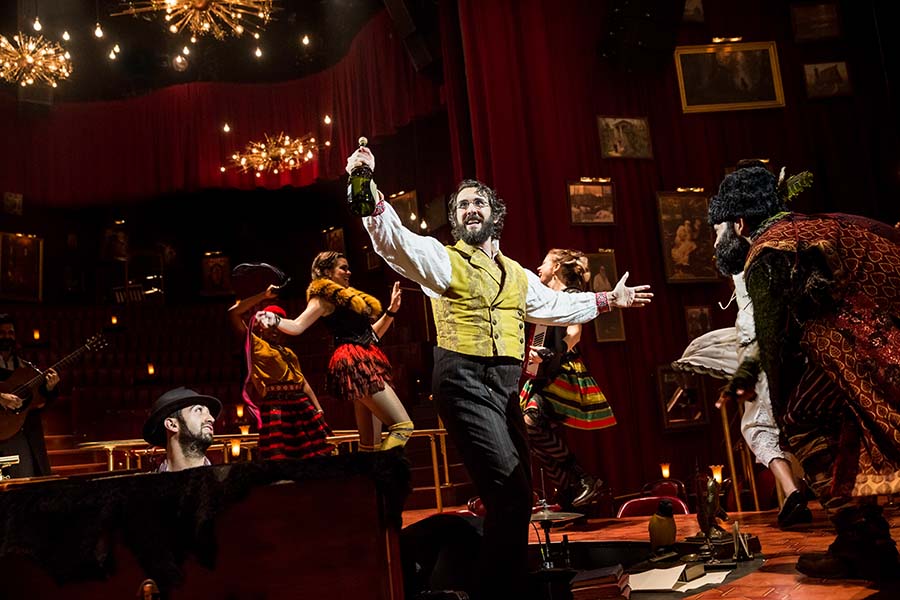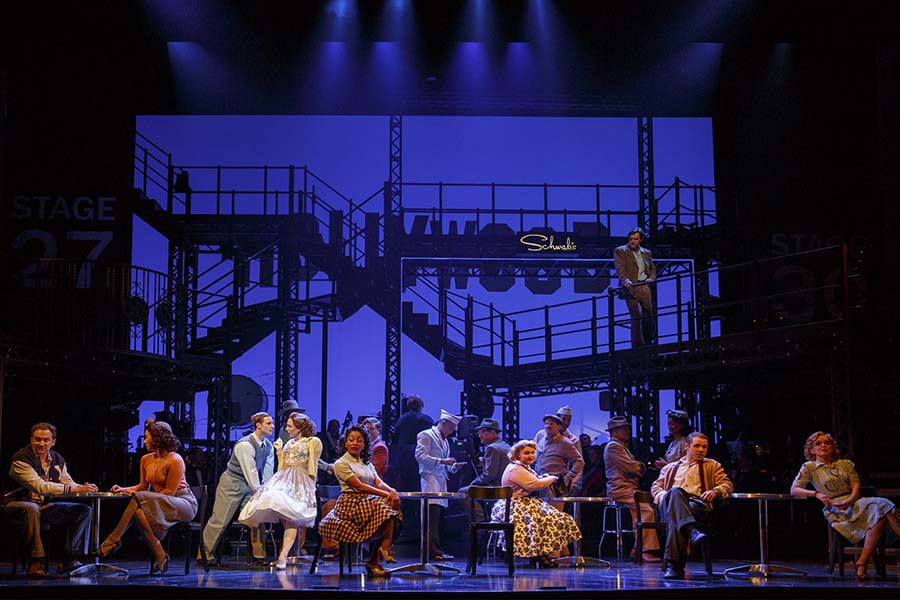On Broadway, the star usually takes the final bow, but these days Glenn Close, Josh Groban, and Jake Gyllenhaal aren’t the last people to command applause at their respective shows. Their conductors are.
Typically, the cast gestures to the pit musicians at the end of curtain call, but in the current runs of Sunset Boulevard, Natasha, Pierre and the Great Comet of 1812, and Sunday in the Park With George, the orchestra is onstage, in full view of the audience. So when the stars and the assembled casts of these shows do the requisite gesture to their musical leader, the conductor is on hand to step forward for a bow.
“I have to walk from the podium to the edge of the stage, and that’s something I’m not used to doing,” says Kristen Blodgette, the music director and music supervsisor of Sunset Boulevard. For Or Matias, Great Comet‘s music director, being onstage is part of the appeal of the gig. As a composer and songwriter, Matias doesn’t actively seek out conducting work, but Great Comet was a special case, as it gives him the opportunity to play with a band as he might in a more rock-style environment.
“Theatre is not where I came from, and music directing was never something that I considered a career path—I just always wanted to write music and work with musicians,” says Matias, who grew up in Israel before studying classical piano at Juilliard and then finding his way into the musical theatre writing program at New York University. “Performing is something I’ve always really loved to do, and I thought in my adult life I’d be a singer/songwriter. The energy of being behind a piano and performing onstage was something I was always drawn to. Instead of conducting a show from behind a screen or in a pit, you actually get to be in on the action and in on the storytelling.”

Sunday‘s Chris Fenwick, however, always knew he wanted to be a Broadway music director. “It was Sunday in the Park that started that passion,” he says. “It was a very important show to me growing up in ways that I don’t know I fully grasped as a 10-year-old. I felt really drawn to this piece. I listened to a vinyl copy of it. I think I got it from the public library in Minneapolis.”
While he might be most comfortable at the conductor’s podium, Fenwick does enjoy being onstage, and has experience from music directing many shows at New York City Center, where this production of Sunday in the Park began as a concert staging last fall before moving to Broadway.
Sunset Boulevard also began as a concert at the London Coliseum. Indeed, both Blodgette and Fenwick note that there was never any consideration that the orchestra be demoted to the pit on the Main Stem.
“There was a feeling that we all wanted the audience to get the full experience, and that included being aware of what the musicians were doing, and by extension what the composer was doing,” says Fenwick. “The amazing thing about seeing musicians and actors perform a musical together onstage is that it all informs an audience’s enjoyment of how complete and democratic that art form is.”
In Blodgette’s case, the pit wasn’t even an option: Sunset Boulevard boasts the biggest orchestra on Broadway, with 40 players. In fact, it was a bit of a stretch to even fit all of the musicians onstage at the Palace Theatre.
“It had been measured really carefully and blocked out,” she says. “And once we got into the theatre, people just did not have room to move. The set designer built an additional platform, and we have to put people on the side stage.” This setup leads to more limited playing space for the cast, but Blodgette praises director Lonny Price and choreographer Stephen Mear for making the show “look creative and vital without making it feel like a concert.”
Both Matias and Fenwick view themselves as “performing in the show,” and in Matias’s case, he even has costumes and choreography cues in certain songs, as the Imperial Theatre has been transformed into an immersive Russian café for the show. Under Actors’ Equity’s designation, Matias is not considered an actor; when he worked on composer Dave Malloy’s Preludes at Lincoln Center, the union did consider him a performer.
“The distinction they have is whether you open your mouth,” says Matias, who sheepishly admits that he might occasionally be caught singing along with the ensemble in Great Comet. “I mean, I do—I don’t know if I’m supposed to, but I do,” he says, adding that he’ll lean into Groban’s microphone when he’s nearby.
Matias really relishes the performing experience, interacting with nearby audience members before the show, noting that a comfort with this kind of engagement is a job requirement for the show. “The conductor really has to be comfortable being visible and comfortable interacting with people,” he says. “There are spills that happen around the pit. Having done a lot of performing on stages that have been more in the rowdy rock ‘n’ roll scene have allowed me to deal with things in a calm way as they come up.”

For her part, Blodgette does not think of herself as a performer in Sunset, instead considering herself more of a “facilitator.” As someone who is more accustomed to the pit setup as a seasoned conductor and music director, she finds that the main challenge of being onstage is having her back to the performers.
“You have to be really careful with how you drive it when you’re not looking at someone, but I love that challenge,” she says. “I have a monitor of the cast but it’s about five inches, so I don’t count on seeing them that way at all. When I have to see something, I turn around and look.”
Fenwick encounters the same challenge, and turns around sometimes, especially during “Color and Light,” when Gyllenhaal is miming pointillistic painting techniques and the music needs to line up with the gestures. Knowing that he wouldn’t be able to see the actors affected how Fenwick rehearsed the music with the cast.
“I tend to get everyone onto the same stage so that we have all fully explored the show musically in rehearsal and we all know what we are going to collectively do during performances,” Fenwick notes. “Things can still be spontaneous onstage when we all sort of know what we’re doing in each moment so we don’t have to see each other visually. We all collectively make artistic and musical choices both prior to the evening.”
Blodgette didn’t get the luxury of a lot of rehearsal with the cast since she did not conduct the show in London, and the lead actors came from that production. She did work with the ensemble, though, which is new for Broadway, and she says the stars were very open to discovery and exploration during the short rehearsal time. And Blodgette was familiar with the score, as she was associate musical supervisor on the original 1994 production and has made a career out of conducting and music directing Andrew Lloyd Webber shows.
Matias doesn’t face away from the actors, but he also has no visual monitors because the screens would disrupt the audience’s 360 experience. And while there are 10 seated musicians arrayed around him, there are also 8 actors with instruments who roam the entire theatre all the way to the balcony, which can make conducting a challenge. So how does he keep everyone on the same page?
“I raise my hands as high as they go is the true answer,” Matias admits. “It’s kind of a madness that has a little bit of the method. The ideal is to have me in a place where sightlines are the most visible, so that at any given moment anybody could glance to their left or right. The instrumentalists do have in-ear monitors, which help, because they get a very specific mix in their ear which is centered around the rhythm section so they can stay on the beat.”
While both Sunset and Comet are sung-through with almost no pauses in the music, Sunday does have book scenes. “I sort of try and preserve stillness onstage,” Fenwick says of those moments. “The musicians are very attuned to the scene work and very attuned to the performers.”
Like most Broadway music directors, Fenwick sits out in the audience for one performance each week to take notes while associate conductor and musical supervisor Mark Mitchell conducts, and Matias has two alternates who can sub in. Blodgette has an associate who can take over the baton, but she has no plans to leave her podium.
“I have no intention of missing a show,” she says, as the production is a limited run. While she took notes from the audience when she conducted shows like Cats and Phantom of the Opera, this time feels different. “I don’t know how to describe it. I just don’t want to miss it.”


